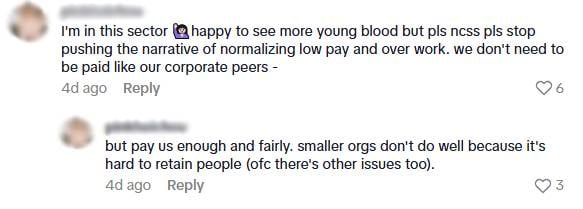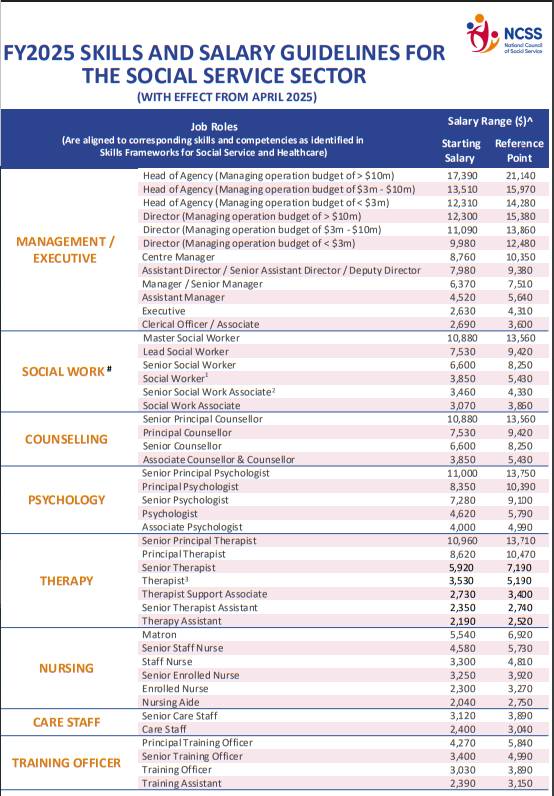SINGAPORE: A TikTok advertisement by the Social Service Tribe has sparked online backlash over what many say is the normalisation of low pay and burnout in Singapore’s social service sector.
Viewers criticised the campaign for appearing to romanticise underpayment and excessive workload, prompting renewed discussion about working conditions in the industry.
The Social Service Tribe is a movement led by the National Council of Social Service (NCSS), aimed at uniting over 20,000 social service professionals (SSPs) across more than 500 social service agencies (SSAs) in Singapore. It promotes careers in the sector and highlights the value of serving vulnerable communities.
In a full-length video shared on Instagram on 26 March 2025, SPD Singapore psychologist Sylvia Goh described her work in educational psychology — including school placement assessments and supporting teachers and therapists during intervention sessions with children.
Sylvia said her role gave her the opportunity to work closely with families from vulnerable backgrounds.
“I feel that it’s a lot more meaningful to journey with them in some sense,” she said.
On the topic of pay, Sylvia remarked, “The pay in social service is… as worth it as you deem it to be.”
She recalled a professor once telling her, “If you are in it for the money, you are in the wrong industry.”
She added that working with children reminds her of the silver linings seen through their innocent and hopeful perspectives.
View this post on Instagram
Public Frustration Over “Romanticising Underpayment”
The comments section quickly filled with critical responses, with many accusing the campaign of glossing over the real challenges faced by social service professionals.
“I hope we can stop pushing this propaganda forcing our workers in social service to be ‘happy’ with their pay,” one commenter wrote.

Others shared firsthand accounts of being underpaid and overworked.
One former worker said that high caseloads often fall on junior staff—many of whom are bonded—due to the sector’s difficulty in retaining experienced professionals.

While some acknowledged the meaningful nature of the work, they rejected the notion that passion should justify low compensation.
“We don’t need to be paid like our corporate peers — but pay us enough and fairly,” said one user.

Many also raised concerns about poor work-life balance, citing cases of minimal rest days and expectations to respond to work matters outside office hours.
For these workers, fulfilment alone cannot offset the financial and emotional toll.

Some felt the video indirectly shamed those who voiced concerns about pay, framing them as lacking commitment or moral fibre.
One frustrated commenter described the ad as “a roundabout way to say social workers are underpaid and that their morals should be called into question if they dare to complain.”

Another wrote bluntly, “This is horrible. YES LET’S NORMALISE POOR PAY and work with passion because us in the social service sector don’t have families to feed.”
As one commenter put it, “At the end of the day, beyond passion, we all do our jobs—across different sectors—to put food on the table and survive.”

Low pay and high burnout have long plagued Singapore’s social service sector.
A 2023 CNA report found that the turnover rate at Dementia Singapore rose from 14 per cent in 2021 to 16 per cent in 2022.
Chief Human Resources Officer Tracy Kwan said many former employees had moved on to the finance sector, and job applications had dropped by 30 per cent in the six months prior.
Kwan cited three common perceptions: that the work is emotionally and physically draining, pay is relatively low, and career progression is limited.
The Ministry of Social and Family Development (MSF) reported in 2019 that the overall annual resignation rate of social workers was 17 per cent, down from 20% in 2015.
The most common reasons for leaving included seeking better career opportunities, family and caregiving needs, and poor job fit.
Concerns Persist Despite Salary Guidelines
In January 2025, Minister for Social and Family Development Masagos Zulkifli acknowledged that the Government had taken steps to improve pay in the sector, including issuing recommended salary guidelines.
Masagos said the Ministry and NCSS would work with social service agencies to improve adherence to these guidelines and share salary adherence rates with the agencies for benchmarking.
According to NCSS’s FY2025 salary guidelines, a nursing aide in social service starts at $2,040, while a psychologist like Sylvia Goh starts at $4,620.
Salaries on the management track rise significantly — heads of agencies managing budgets over $10 million start at $17,390, with a reference point of $21,140.

While the campaign may have aimed to spotlight the meaningful contributions of social service professionals, it struck a nerve with many who feel their day-to-day realities remain overlooked.
The strong reaction online reflects a deeper desire for honest conversations — not just about passion, but about sustainable careers and fair treatment for those serving on the frontlines.
The post Netizens decry ‘romanticised’ portrayal of low pay in Social Service Tribe video appeared first on The Online Citizen.



